- Home
- Maggie Stiefvater
The Raven King Page 2
The Raven King Read online
Page 2
As one, the women stopped shuffling, closed their eyes, and held their decks to their hearts, focusing only on each other and the way that their lives were twined together. The candles flickered. Long and short and then long shadows played behind the goddess sculptures. Gwenllian hummed, and after a moment, Jimi did as well.
Only Artemus sat apart, brows furrowed.
But the women included him when they began to lay out the cards. First they braided a row of cards into a solid trunk, whispering positions and meanings to each other as they did. Then they laid out cards in branches that pointed to Artemus, to Jimi, to Orla. And they laid out cards in roots that pointed to Calla, to Maura, to Gwenllian. They knocked heads and laid cards over the top of each other and laughed over their bumbles and gasped over the order of the cards.
Eventually a story appeared. It was about the people they had changed, and the people who’d changed them. The reading included all the juicy bits: when Maura had fallen in love with Artemus; when Jimi had punched Calla; when Orla had secretly drained the common bank account for a business website that had yet to make money; when Blue had run away from home and been dragged home by the cops; when Persephone had died.
The branch that led to Artemus was grim and rotten, littered with swords and fear. The darkness in it led back to the trunk, joining up with something sinister moldering in the root that belonged to Gwenllian. It was obvious that this darkness would be what killed them all if they did nothing, though it was impossible to tell what precisely it was. The women’s clairvoyance had never been able to penetrate the area directly over the ley line, and this darkness was centered there.
The solution to the darkness, however, existed outside of the ley line. It was multifaceted, uncertain, and difficult. The upshot was straightforward, though.
“They’re supposed to work together?” Calla said with disbelief.
“That’s what it says,” Maura said.
Jimi reached for the whiskey bottle, but it was empty. “Can’t we just take care of it ourselves?”
“We’re just people,” Maura replied. “Just ordinary people. They’re special. Adam’s tied to the ley line. Ronan’s a dreamer. Blue amplifies all of that.”
“Richie Rich is just a person,” Orla said.
“Yes, and he’s going to die.”
The women contemplated the spread again.
“Does this mean she’s still alive?” Maura asked, tapping on a card in one of the branches — the Queen of Swords.
“Probably,” Calla grunted.
“Does this mean she’s going to leave?” Orla asked, tapping on another card and referring to a different she.
“Probably,” Maura sighed.
“Does this mean she’s coming back?” Calla demanded, pointing to a third card and meaning a third she.
“Probably,” shrieked Gwenllian, leaping up from the table. She began to spin with her arms in the air.
None of them could sit still any longer. Calla pushed back her chair. “I’m getting another drink.”
Jimi clucked in agreement. “If it’s the end of the world, I might as well, too.”
As the others left the table, Maura remained, looking at Artemus’s poisoned branch of cards and at Artemus himself, hunched behind it. Random men from mystical groves were no longer her type. But still, she remembered loving Artemus, and this Artemus was greatly diminished.
“Artemus?” she asked gently.
He didn’t lift his head.
She touched his chin with a finger; he flinched. She tilted his face up so that they were eye to eye. He had never rushed to fill spaces with words, and he still didn’t. He looked as if he might never speak again, if he could help it.
Since they had both climbed out of the cave, Maura had not asked him about anything that had happened in the years since she’d seen him last. But now she asked, “What happened to you to make you like this?”
He closed his eyes.
Where the hell is Ronan?” Gansey asked, echoing the words that thousands of humans had uttered since mankind developed speech. As he stepped out of the science building, he tipped his head backward, as if Ronan Lynch — dreamer of dreams, fighter of men, skipper of classes — might somehow be flying overhead. He was not. There was only a plane tracing silently through the deep blue above the Aglionby campus. On the other side of the iron fence beside them, the town of Henrietta made productive afternoon business noises. On this side, the students of Aglionby made unproductive afternoon teenage noises. “Was he in Technology?”
Adam Parrish — magician and puzzle, student and logician, man and boy — shuffled his ambitiously laden messenger bag onto his other shoulder. He saw no reason why Gansey would believe Ronan had been anywhere near the campus. It was taking all of Adam’s willpower to focus on Aglionby after the week of magical caves and mysterious sleepers they’d just had, and Adam was the most motivated student there. Ronan, on the other hand, had only shown up to Latin with any regularity, and now that every Latin student had been ignominiously shunted into an extra section of French, what was left for him?
“Was he?” repeated Gansey.
“I thought it was a rhetorical question.”
Gansey looked angry for approximately the length of time it took for a late butterfly to bluster by them in the autumn breeze. “He’s not even trying.”
It had been over one week since they’d retrieved Maura — Blue’s mother — and Artemus — Blue’s … father? — from the cave system. Three days since they had put Roger Malory — Gansey’s ancient British friend — on a plane back to the UK. Two days back at school this week.
Zero days of Ronan attendance.
Was it a foul waste? Yes. Was it entirely Ronan Lynch’s responsibility? Yes.
Behind them, the bell rang noisily in the science building, two minutes after the period had actually ended. It was a proper bell with a proper rope, and it was supposed to be rung properly at the end of the period by a proper student. The two-minute disparity prematurely aged Adam Parrish. He liked it when people knew how to do their jobs.
“Say something,” Gansey said.
“That bell.”
“Everything is terrible,” agreed Gansey.
The two friends stepped off the walk to make the trek across the sports fields. It was a gift, this commute from the science building to Gruber Hall, ten luxurious minutes gulping air and sunshine between classes. Being on campus in general comforted Adam; the predictable routine cradled him. Study hard. Go to class. Hold up your hand. Answer the question. March toward graduation. Other classmates complained about the work. Work! Work was the island Adam swam to in a stormy sea.
And the sea was very stormy. Monsters churned in the ley line beneath them. A forest grew through the hands and eyes Adam had bargained away to Cabeswater. And Gansey was supposed to die before April. That was the troubled ocean — Glendower was the island. To wake him was to get a favor, and that favor would be to save Gansey’s life. This enchanted country needed an enchanted king.
That weekend, Adam had dreamt twice that they had already found Glendower and were now seeking him again. The first night he’d had the dream, it had been a nightmare. The second time, a relief.
He asked carefully, “What’s next for the Glendower search?”
“The Dittley cave,” Gansey said.
This answer startled Adam. Ordinarily Gansey favored the cautious approach, and the Dittley cave was the opposite. For starters, after they pulled Glendower’s daughter Gwenllian out of it, strange animals had begun crawling from the mouth every so often. And for finishers, Piper Greenmantle had shot Jesse Dittley dead at its entrance. Everything about the cave reeked of past and future death. “You don’t think Gwenllian would’ve told us if she thought her father was farther down in that cave, instead of having us wander the cave of bones?”
“I think Gwenllian serves her own purpose,” Gansey replied. “And I have yet to figure out what it might be.”
“I just don’
t think it’s a reasonable risk. Plus, it’s a crime scene.”
If Ronan had been there, he would have said, Everywhere’s a crime scene.
Gansey said, “Does this mean you have different ideas?”
Ideas, plural? Adam would have been happy to have a single idea. The most promising way forward, a cave in Cabeswater, had collapsed during their last excursion, and no new opportunities had appeared to replace it. Gansey had observed that it felt like a test of worthiness, and Adam couldn’t help but agree. Cabeswater had assigned them a trial, they’d set themselves at it, and somehow they’d been found wanting. It had felt so right, though. He and Ronan had worked together to clear the cave of hazards, and then the entire group had pooled their talents to briefly revive the skeletons of an ancient herd that had led Ronan and Blue to Maura. Every night since then, Adam had relived that memory before he went to sleep. Ronan’s dreams, Adam focusing the ley line, Blue amplifying, Gansey speaking the entire plan into motion. Adam had never felt so … intrinsic before. They had been a fine machine.
But it hadn’t taken them to Glendower.
Adam suggested, “Talk more to Artemus?”
Gansey made a hm sound. It would have been pessimistic coming from anyone but was doubly so coming from him. “I don’t think we’ll have a problem talking to Artemus. It’s getting him to talk back I’m worried about.”
“I thought you always said you were persuasive,” Adam said.
“Experience has not proven this to be the case.”
“Gansey Boy!” shouted a voice across the fields. Whitman, one of Gansey’s old rowing teammates, lifted three fingers in salute. Gansey didn’t respond until Adam lightly touched his shoulder with the back of his hand. Gansey blinked up, and then his face transformed into his Richard Campbell Gansey III smile. What a treasure that smile was, passed down through the ages from father to son, tucked away in hope chests during son-less generations, buffed and displayed proudly whenever company was over.
“Sitwhit,” Gansey called back, his old Southern accent rolling generously through the vowels. “You left your keys in the door!”
Laughing, Whitman zipped up his fly. He loped up beside them, and he and Gansey fell into some effortless conversation. A moment later, two more boys had joined them, then two more again. They bantered lightly back and forth, buoyant and youthful and convivial, advertisements for clean living and good education.
This was a master class that Adam had never gotten good at, although he’d spent months in dedicated study. He analyzed Gansey’s mannerisms, dissected the other boys’ reactions, and cataloged dialogue patterns. He watched how an easy gesture unfolded a bouquet of mannish conversation, elegant as a magic trick. He took careful note of the behind-the-scenes footage: how a miserable Gansey could become a hospitable one in just a moment. But he could never work out the practicum. Warm greetings iced in his mouth. Casual gestures became dismissive. A steady eye contact turned into an unnerving stare.
He’d retaken the class each quarter, but he thought, incredibly, maybe there were some skills even Adam Parrish couldn’t pick up.
“Where’s Parrish?” asked Engle.
“He’s right there,” Gansey replied.
“Don’t know how I missed the wind off the glacier,” Engle said. “What’s up, man?”
It was a rhetorical question, answerable by a lightly painted smile. The boys were here for Gansey. Where’s Parrish? In a place too far away to hike to in a day.
Once upon a time, this dynamic would have unsettled Adam. Threatened him. But now he was certain in his place as one of Gansey’s two favorites, so he merely put his hands in his pockets and walked quietly alongside the rest.
Suddenly, Adam felt Gansey tense beside him. The others were still hooting and laughing, but Gansey’s expression had gone pensive. Adam followed his gaze to the great columns that held up the roof of Gruber Hall. Headmaster Child stood at the top of the stairs between them, a textbook or something similar in hand. He was a leathery bird of a man, a hearty recommendation for sunscreen and broad-brimmed hats.
“All right, gentlemen,” he called. “I could hear you from my office. Are we conducting ourselves like ravens? Class awaits.”
Fist bumps were exchanged; hair was scrubbed; shoulders were knocked. The other boys dispersed; Gansey and Adam remained. Child lifted a hand to Gansey in a sort of wave before ducking into the offices of Gruber Hall.
Again Gansey looked angry, and then he looked nothing at all. He resumed his walk to class.
“What was that?” Adam asked.
Gansey pretended not to have heard as they climbed the stairs Child had just stood on.
“Gansey. What was that about?”
“What?”
“The hand. Child.”
“It’s friendly.”
It was not unlike the world to be friendlier to Gansey than to Adam, but it was unlike Headmaster Child. “Tell me you won’t tell me, but don’t tell me a lie.”
Gansey made a big fuss over tucking in his uniform shirt and pulling down his sweater. He didn’t look at Adam. “I don’t want to fight.”
Adam made an educated guess. “Ronan.”
Gansey’s eyes went to him furtively and back to his sweater.
“No way,” Adam said. “What. No. You didn’t.”
He didn’t know exactly what he was accusing Gansey of. Just — he knew what Gansey wanted for Ronan, and he knew how Gansey got things.
“I don’t want to fight,” Gansey repeated.
He reached for the door; Adam put his hand on it, preventing him.
“Look around you. Do you see Ronan? He doesn’t care. You stuffing it down his throat isn’t going to make him hungry.”
“I don’t want to fight.”
Gansey was saved by a buzzing from his person; his phone was ringing. Technically they were not meant to take calls during the school day, but he retrieved the phone and twisted the face so that Adam could see it. Two things struck Adam: First of all, the call said it was from Gansey’s mother, which it probably was, and secondly, Gansey’s phone said it was 6:21, which it definitely wasn’t.
Adam’s position changed subtly, no longer blocking Gansey from entering Gruber but rather pressing a hand to the door to act as a lookout.
Gansey put the phone to his ear. “Hello? Oh. Mom, I’m in school. No, the weekend was yesterday. No. Of course. No, just go quickly.”
As Gansey spoke to the phone, Cabeswater beckoned to Adam, offering to support his tired form, and for just a minute, he allowed it. For a few effortless breaths, everything was leaves and water, trunks and roots, rocks and moss. The ley line hummed inside him, waxing and waning with his pulse, or vice versa. Adam could tell that the forest needed to tell him something, but he couldn’t quite work out what it was. He needed to scry after school or find the time to actually go to the forest.
The phone was hung up, put away. Gansey said, “She wanted to know if I liked the idea of holding a last-minute campaign thing here on campus this weekend. If Raven Day would conflict, if it would be okay to run it by Child. I said that — well, you heard what I said.”
Actually, Adam had not. He had been listening to Cabeswater. In fact, he was still listening to it so intently that when it suddenly and unexpectedly swayed, he swayed, too. Unnerved, he snatched at the doorknob to ground himself.
The hum of the energy had vanished inside him.
Adam barely had time to wonder what had happened and whether the energy would return when the ley line mumbled to life inside him again. Leaves unfurled in the back of his mind. He released the doorknob.
“What was that?” Gansey asked.
“What?” Adam, a little breathless, nonetheless mimicked Gansey’s earlier tone almost precisely.
“Don’t be an ass. What happened?”
What had happened was someone had just docked an enormous amount of power from the ley line. Enough that it had made even Cabeswater catch its breath. In Adam’s limited experien
ce, there were only a few things that could make that happen.
As the energy slowly clocked back up to speed, he told Gansey, “I’m pretty sure I know what Ronan’s doing.”
That morning, Ronan Lynch had woken early, without any alarm, thinking home, home, home.
He’d left Gansey still sleeping — his phone clutched in a hand and his wireframes folded in slumber a few inches away on the mattress — and crept down the stairs with his raven pressed against his chest to keep her quiet. Outside, overgrown grass lapped dew on Ronan’s boots, and mist curled around the tires of the charcoal BMW. The sky over Monmouth Manufacturing was the color of a muddy lake. It was cold, but Ronan’s gasoline heart was firing. He settled into the car, letting it become his skin. The night air was still coiled beneath the seats and lurking in the door pockets; he shivered as he tethered his raven to the seat belt fastener in the passenger seat. Not the fanciest setup, but effective for keeping a corvid from flapping around one’s sports car. Chainsaw bit him, but not as hard as the early morning cold.
“Hand me my jacket, turd?” he told the bird. She just pecked experimentally at the window controls, so he got it himself. His Aglionby jacket was back there, too, hopelessly crumpled beneath the language puzzle box, a dream object that translated several languages, including an imaginary one, into English. When was he going to school again? Ever? He thought he might officially quit tomorrow. This week. Next week. What was stopping him? Gansey. Declan. His father’s memory.
It was a twenty-five-minute drive to Singer’s Falls even at this hour of the morning, but it was still well before dawn when he passed through the nonexistent town and finally arrived at the Barns. Briars and branches and trees closed around the car as it tunneled down the half-mile drive. Carved out of wooded foothills, accessible only by the winding drive through the tangled forest, the property was alive with the sounds of the surrounding messy Virginia woods: oak leaves stuttering against each other, coyotes or deer crunching through the undergrowth, dry grass whispering, owls querying owls, everything breathing and shifting out of sight. It was too cold for fireflies, but a multitude of them glistened in and out of being above the fields nonetheless.

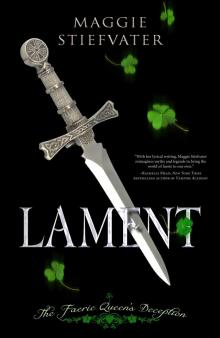 Lament: The Faerie Queens Deception
Lament: The Faerie Queens Deception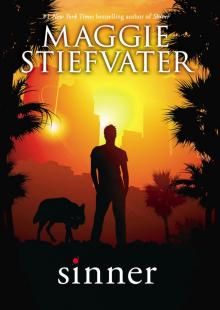 Sinner
Sinner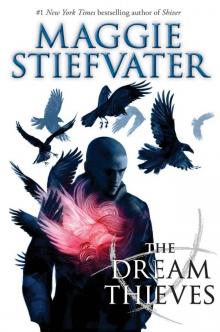 The Dream Thieves
The Dream Thieves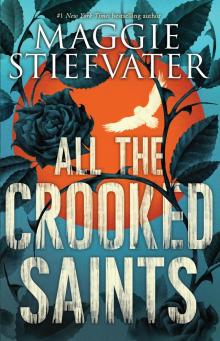 All the Crooked Saints
All the Crooked Saints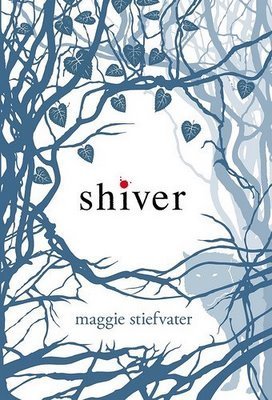 Shiver
Shiver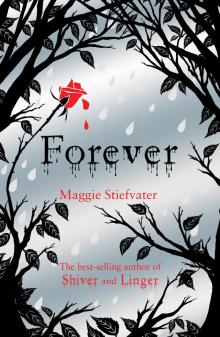 Forever
Forever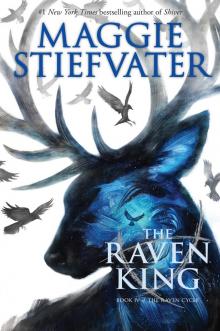 The Raven King
The Raven King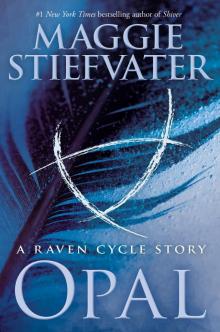 Opal
Opal Linger
Linger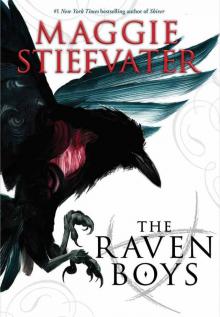 The Raven Boys
The Raven Boys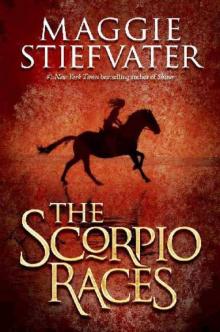 The Scorpio Races
The Scorpio Races Hunted
Hunted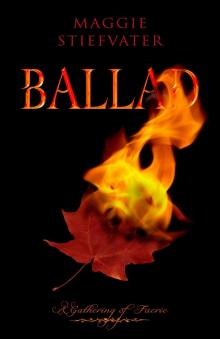 Ballad: A Gathering of Faerie
Ballad: A Gathering of Faerie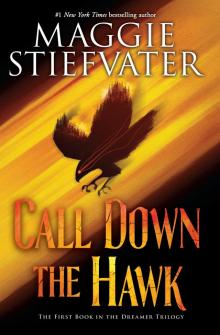 Call Down the Hawk
Call Down the Hawk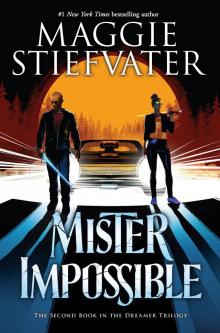 Mister Impossible
Mister Impossible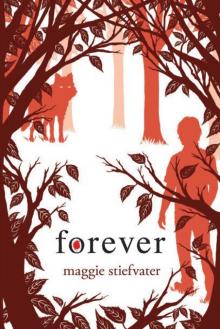 Wolves of Mercy Falls 03 - Forever
Wolves of Mercy Falls 03 - Forever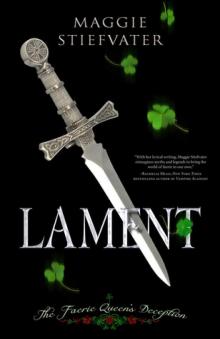 Lament
Lament![Maggie Stiefvater - [Wolves of Mercy Falls 02] Read online](http://i1.bookreadfree.com/i1/04/04/maggie_stiefvater_-_wolves_of_mercy_falls_02_preview.jpg) Maggie Stiefvater - [Wolves of Mercy Falls 02]
Maggie Stiefvater - [Wolves of Mercy Falls 02]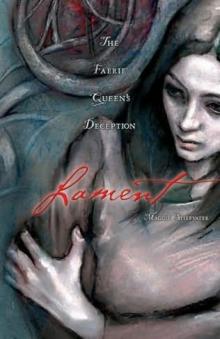 Lament: The Faerie Queen's Deception
Lament: The Faerie Queen's Deception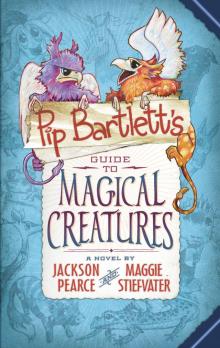 Pip Bartlett's Guide to Magical Creatures
Pip Bartlett's Guide to Magical Creatures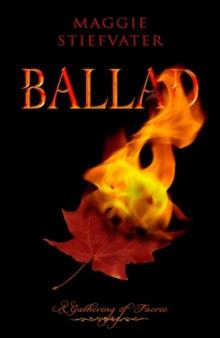 Ballad
Ballad